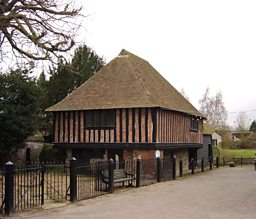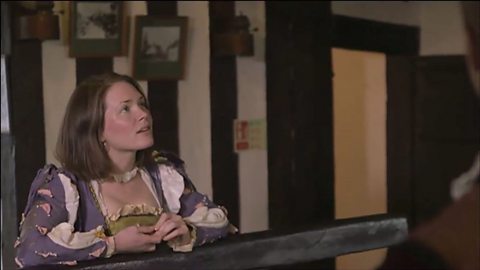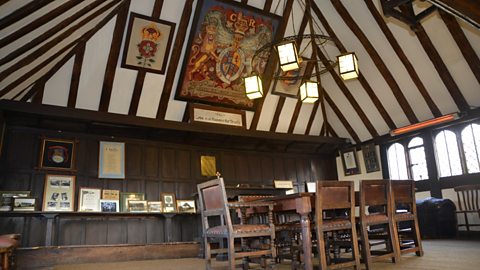A rare example of a surviving Shakespearean venue
It's a rare example of a surviving venue where Shakespeare's plays were performed in his lifetime. Shakespeare’s company visited the tiny Kent village of Fordwich near Canterbury as The King’s Men in 1605-6, when records show the players were paid ten shillings by the town.
The actors are thought to have performed in the upper room of the town’s small medieval guild hall which survives to the present little altered.
-
![]()
Much ado near me
Hear more Shakespeare stories on BBC Radio Kent
-
![]()
Shakespeare Festival 2016
The BBC celebrates the genius of the bard


Fordwich Town Hall
Modern players reflect on the venue's fascinating past
This makes the venue one of the few surviving buildings likely to have staged a Shakespeare play during the dramatist’s own lifetime…a rare example of a Shakespearean ‘theatre’ which still exists.
But how could tiny Fordwich – estimated population of only a few hundred people at the time – afford to put on a performance by the prestigious King’s Men?
In this case the audience was presumably a select one, perhaps limited to local civic officials. The records don’t tell us which play or plays Shakespeare’s company performed in Fordwich but in 1605-6 the troupe’s new Shakespeare plays included All’s Well That Ends Well, King Lear, Macbeth, and Antony and Cleopatra and they performed Henry V and The Merchant of Venice at court in 1605 so there’s a chance that these were also in the touring repertory and would have been available for performance in Fordwich.
As when they visited other Kentish towns, it is possible that the company would have performed one or more plays which alluded to Kent. Henry V might have been of appeal because of its dramatization of Anglo-French conflict and English victory.
As in other Kentish coastal towns, the historical danger of French invasion made Anglo-French relations a potential source of interest and anxiety for local people in Fordwich and the ruling elites in particular.

But how could tiny Fordwich – estimated population of only a few hundred people at the time – afford to put on a performance by the prestigious King’s Men? One theory, from a local historian, is that nearby Canterbury had become so puritanical that the mayor of Fordwich saw an opportunity to bring the King’s Men – and perhaps some much-needed business - to the town. It would give those prevented from seeing plays around Canterbury the opportunity to walk or go by horse to nearby Fordwich for their entertainment.

Inside Fordwich Town Hall
Fordwich Town Mayor Patrick Heren takes you around the historic venue
Shakespeare on Tour
From the moment they were written through to the present day, Shakespeare’s plays have continued to enthral and inspire audiences. They’ve been performed in venues big and small – including inns, private houses and emerging provincial theatres.

BBC English Regions is building a digital picture which tracks some of the many iconic moments across the country as we follow the ‘explosion’ in the performance of The Bard’s plays, from his own lifetime to recent times.
Drawing on fascinating new research from Records of Early English Drama (REED), plus the British Library's extensive collection of playbills, as well as expertise from De Montfort University and the Arts and Humanities Research Council, Shakespeare on Tour is a unique timeline of iconic moments of those performances, starting with his own troupe of actors, to highlights from more recent times. Listen out for stories on Shakespeare’s legacy on your BBC Local Radio station from Monday 21 March, 2016.
You never know - you might find evidence of Shakespeare’s footsteps close to home…
Craig Henderson, BBC English Regions
Related Links
-
![]()
Shakespeare Lives
The nation’s greatest performing arts institutions mark 400 years since the Bard's death
Shakespeare on Tour: Around Kent
-
![]()
Touring Kent to avoid the plague in London
Shakespeare's Lord Strange’s Men perform in Kent
-
![]()
‘Wherefore to Dover?’
Dover, Faversham and the 1597 tour
-
![]()
Small towns big on Shakespeare
How Shakespeare's company visited the smallest towns
-
![]()
Mrs Hamblin - A woman scorned
The tumultuous private life of a famous American actress
-
![]()
Sir Edward Dering – Proud owner of Shakespeare’s First Folio
And possibly the host of the first amateur performance of Shakespeare
-
![]()
Dover Theatre and Miss Davenport
'The juvenile actress of the day'
Shakespeare on Tour: Around the country
-
![]()
The King's Men generously welcomed to Cumbria
King James I also spends time in Cumbria
-
![]()
Shakespeare… by gaslight!
An 1819 playbill invites people to enjoy the newly-installed gas lighting in the theatre
-
![]()
Shakespeare's acting company come to Barnstaple
Was Shakespeare among them?
-
![]()
Garrick’s festival entertains a Birmingham audience
Famous Jubilee Shakespeare celebration comes to the second city













